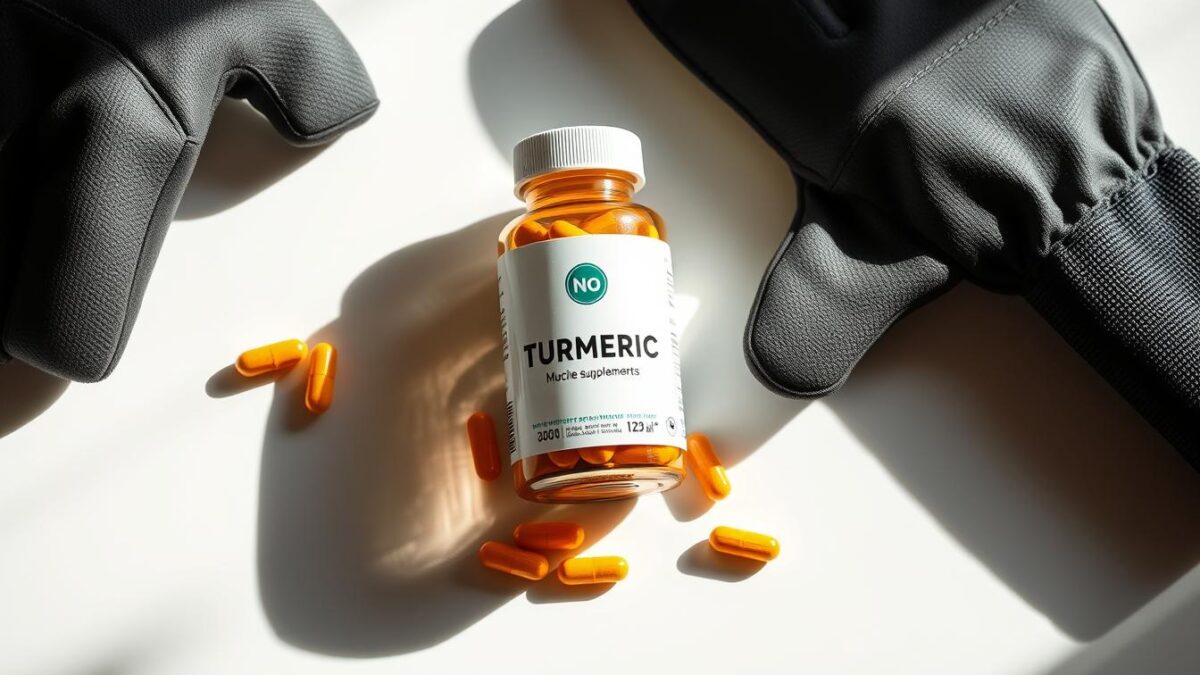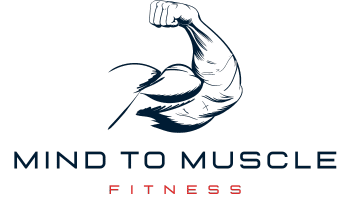
Turmeric Supplements: Do They Reduce Workout Soreness?
Are you tired of feeling sore after a tough workout? You might wonder if turmeric supplements could help. Turmeric is famous for its anti-inflammatory powers, thanks to curcumin. It’s becoming a go-to natural remedy for muscle recovery.
In this article, we’ll dive into the benefits of curcumin. We’ll see how these supplements work and if they really help with workout soreness.
Understanding Workout Soreness
Workout soreness, or Delayed Onset Muscle Soreness (DOMS), is common among fitness lovers. Knowing why it happens helps you manage your workouts better.
What Causes Delayed Onset Muscle Soreness (DOMS)?
DOMS happens after intense or new workouts. It’s caused by tiny muscle tears from the strain. This damage starts an inflammatory response, leading to soreness 24-48 hours later.
How Long Does Workout Soreness Last?
The time it takes to recover from soreness varies. It usually peaks 48 to 72 hours after the workout. Recovery and soreness usually go away in 5 to 7 days. Knowing this helps plan workouts and recovery for better performance and muscle repair.
The Role of Turmeric in Reducing Inflammation
Turmeric is known for its ability to help with muscle soreness. This is thanks to a key part called curcumin. It’s a bright yellow compound with strong anti-inflammatory and antioxidant powers. This makes turmeric a great natural choice for post-workout recovery.
Curcumin: The Active Ingredient in Turmeric
Curcumin is the main active part of turmeric. It’s what gives turmeric its bright yellow color and is key to its health benefits. Studies show that curcumin can change how our body reacts to inflammation. This can help reduce muscle soreness after hard workouts.
Anti-Inflammatory Properties of Curcumin
Research shows that curcumin is a strong anti-inflammatory. It blocks the body’s inflammatory pathways. This can lower inflammation markers in the body, leading to less muscle soreness and faster recovery. For those who work out often, turmeric could be a natural way to fight post-exercise inflammation.
Turmeric Supplements for Soreness
Turmeric supplements are a great way to ease workout soreness. They pack a lot of curcumin, the part of turmeric that fights inflammation. Many athletes use them to help their muscles recover faster.
How Do Turmeric Supplements Work?
Turmeric supplements cut down on body inflammation. Curcumin blocks inflammatory pathways, which can reduce muscle soreness. This means you can get back to working out sooner.
Recommended Dosage for Effectiveness
The right amount of turmeric supplements is between 150 mg to 1,500 mg a day. Taking it in two or three doses, before and after workouts, might work best. Sticking to a routine helps curcumin do its job over time.
Research on Turmeric Supplements and Soreness Relief
Studies have looked into how turmeric supplements help with workout soreness. They focus on curcumin, a part of turmeric known for fighting inflammation. While many studies show curcumin can help with soreness and recovery, not all agree.
Studies Supporting the Use of Turmeric
Recent studies show turmeric can help elite athletes. In one study, athletes who took curcumin felt less sore after hard workouts. This suggests curcumin can help with recovery after tough exercises.
Conflicting Evidence on Efficacy
But, not all studies agree on turmeric’s benefits. Some found no difference in soreness relief between curcumin users and those who took a placebo. Different study methods, dosages, and participant fitness levels might explain these differences. This ongoing debate shows the need for more research on turmeric’s role in muscle recovery.

How to Incorporate Turmeric into Your Routine
Adding turmeric to your daily routine can be a great way to enjoy its benefits. You can choose between supplements or whole foods. Each option has its own benefits, fitting your lifestyle and taste.
Supplementation vs. Whole Food Sources
Turmeric supplements give you a strong dose of curcumin. This is good for those looking for specific health benefits. But, whole foods offer more nutrients and can be used in many dishes.
You can mix turmeric into smoothies, soups, and curries. It adds flavor and health to your meals.
Combining Turmeric with Black Pepper
Using turmeric with black pepper boosts its benefits. Black pepper has piperine, which helps your body absorb curcumin better. Research shows this mix can increase curcumin absorption by up to 2,000%.
Adding black pepper to your turmeric dishes can enhance its anti-inflammatory effects. This makes your meals not only tasty but also good for your health.
Potential Side Effects and Considerations
When thinking about using turmeric supplements for soreness, it’s key to know the possible side effects and how they might interact with medications. Turmeric is known for its benefits, but safety should always come first.
Side Effects of Turmeric Supplements
Most people find turmeric easy to digest. But, some might experience side effects, mainly at high doses of curcumin. These can include:
- Nausea
- Dizziness
- Gastrointestinal discomfort
Watching how your body reacts is important for safety. If you notice any bad effects, you might want to adjust the dose or talk to a doctor.
Interactions with Other Medications
Turmeric can also interact with other medicines, which is something to be aware of, mainly if you’re on prescription drugs. There are a few main concerns:
- Blood thinners, which may increase bleeding risks
- Anti-inflammatory drugs, which might make them less effective
Talking to your healthcare provider before starting turmeric is a good idea. This way, you can make sure it’s safe for you. It helps avoid problems and promotes safer use of supplements.
Real-Life Experiences: Athletes and Turmeric
Many athletes have started using turmeric in their training. They’ve seen great results. Turmeric is known for helping with soreness and improving performance. Let’s look at some athlete stories and testimonials that show these benefits.
Case Studies on Performance Improvement
Studies show athletes who use turmeric do better. Long-distance runners feel less sore and recover faster. Professional cyclists say turmeric helps with inflammation, making their training more consistent.
Testimonials from Fitness Enthuasiasts
Fitness fans share their turmeric stories on social media. They talk about more energy and motivation to work out. They say turmeric not only helps with soreness but also boosts their athletic performance. These stories build a community that supports turmeric for recovery.
| Type of Athlete | Reported Benefits | Performance Improvements |
|---|---|---|
| Long-Distance Runners | Reduced muscle soreness | Faster recovery times |
| Cyclists | Inflammation management | Consistent training routines |
| Weightlifters | Decreased post-workout pain | Increased lifting capacity |
These athlete testimonials show the good effects of turmeric. They share how it helps them, inspiring others to try it.
Alternatives to Turmeric Supplements for Soreness Relief
Turmeric is known for its ability to reduce soreness. But, there are many other options to try. These alternatives can help you find natural ways to ease soreness that fit your lifestyle.
Other Natural Anti-Inflammatory Options
There are several natural ingredients that can help with soreness. Adding these to your diet or routine might be beneficial:
- Ginger: It has anti-inflammatory properties and can help with muscle soreness. You can make ginger tea or add it to your meals.
- Omega-3 Fatty Acids: These are found in salmon and walnuts. They help fight inflammation and aid in muscle recovery.
- Blueberries: They are full of antioxidants. These can help reduce muscle soreness by lowering oxidative stress.
- Tart Cherries: They contain anthocyanins, which have been shown to lessen muscle soreness after exercise.
Conventional Treatments for DOMS
There are also conventional treatments for delayed onset muscle soreness (DOMS):
- Ice Therapy: Using ice packs can reduce swelling and numb pain.
- Massage: Massage can improve blood flow and relax muscles, leading to less soreness.
- Over-the-Counter Pain Relievers: NSAIDs like ibuprofen can temporarily ease soreness.
Knowing about these alternatives to turmeric can help you find the best way to manage soreness. Whether you like natural remedies or conventional treatments, there are many options to choose from.
Expert Recommendations on Turmeric Use
Experts say to use turmeric in moderation when you’re thinking about supplements. It’s known for its anti-inflammatory effects, which is why athletes like it for muscle soreness. But, it’s best to add it to your diet, not just take supplements.
To get the most from turmeric, look for supplements with piperine. It helps your body absorb curcumin better. Start with small doses and slowly increase them. This helps your body get used to it without feeling overwhelmed.
Talking to a healthcare professional is also key. They can give you advice that fits your health needs. This way, you can use turmeric safely and effectively for muscle recovery and soreness relief. By following these tips, you can make the most of turmeric in your fitness routine.



